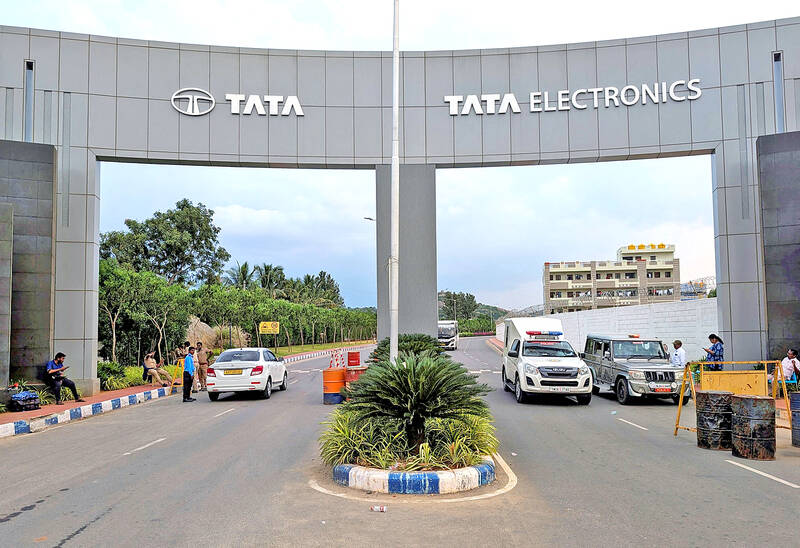At least 10 people received medical treatment, with two hospitalized after a major fire on Saturday disrupted production at a key Tata Electronics Pvt Ltd plant in southern India that makes Apple Inc’s iPhone components.
The fire occurred at the plant in the city of Hosur in Tamil Nadu state that makes some iPhone components. It broke out near another building inside the Tata complex, which was to begin producing complete iPhones in the coming months.
The fire was contained to one building and has been extinguished fully, top district administrative official K.M. Sarayu said.

Photo: Reuters
No decision has been made on when manufacturing could restart, she said.
“Fumes are still coming since it’s a chemical hazard. It will take time for the search and rescue team to go inside and do an assessment. We have to wait till tomorrow,” she added.
Sarayu said that 523 workers were on shift when the fire broke out in the early morning and that all workers had been evacuated and accounted for.
Savitri, an eyewitness who lives near the plant and only gave her first name, said she heard “loud sounds around 5:30am that sounded like crackers going off. After that, we just saw plumes of smoke from the building, and there was thick smoke till at least 10 in the morning.”
The fire began in an area used to store chemicals, a fire official said on condition of anonymity as he was not authorized to speak to the media.
Tata Electronics is one of the major contract makers of iPhones in India, along with Foxconn Technology Group (富士康).
The company said it was investigating the cause of the fire and would take the necessary steps to safeguard employees and other stakeholders.
“Our emergency protocols at the plant ensured that all employees are safe,” a Tata Electronics spokesperson said.
It was not yet possible to say when production at the facility would resume, as “we will need to go in to understand more, depending on the damage,” J. Saravanan, a senior district official charged with handling industrial safety, said.
He said the injuries were all related to smoke inhalation but gave no further detail.
Production was halted and employees were sent home for the day following the fire, a person with direct knowledge of the incident said, describing the blaze as chemical-related.
It was not yet clear if a neighboring building where smartphone manufacturing was due to start by year-end had also been affected, a second industry source said.
With the facility inaccessible at the moment, an assessment of damage from the fire would have to be done later, the source said.
Apple made no immediate comment on the incident.
Last year, Apple supplier Foxlink Group (正崴) halted production at its assembly facility in the southern Indian state of Andhra Pradesh after a massive fire led part of the building to collapse.

Intel Corp chief executive officer Lip-Bu Tan (陳立武) is expected to meet with Taiwanese suppliers next month in conjunction with the opening of the Computex Taipei trade show, supply chain sources said on Monday. The visit, the first for Tan to Taiwan since assuming his new post last month, would be aimed at enhancing Intel’s ties with suppliers in Taiwan as he attempts to help turn around the struggling US chipmaker, the sources said. Tan is to hold a banquet to celebrate Intel’s 40-year presence in Taiwan before Computex opens on May 20 and invite dozens of Taiwanese suppliers to exchange views

Application-specific integrated circuit designer Faraday Technology Corp (智原) yesterday said that although revenue this quarter would decline 30 percent from last quarter, it retained its full-year forecast of revenue growth of 100 percent. The company attributed the quarterly drop to a slowdown in customers’ production of chips using Faraday’s advanced packaging technology. The company is still confident about its revenue growth this year, given its strong “design-win” — or the projects it won to help customers design their chips, Faraday president Steve Wang (王國雍) told an online earnings conference. “The design-win this year is better than we expected. We believe we will win

Chizuko Kimura has become the first female sushi chef in the world to win a Michelin star, fulfilling a promise she made to her dying husband to continue his legacy. The 54-year-old Japanese chef regained the Michelin star her late husband, Shunei Kimura, won three years ago for their Sushi Shunei restaurant in Paris. For Shunei Kimura, the star was a dream come true. However, the joy was short-lived. He died from cancer just three months later in June 2022. He was 65. The following year, the restaurant in the heart of Montmartre lost its star rating. Chizuko Kimura insisted that the new star is still down

While China’s leaders use their economic and political might to fight US President Donald Trump’s trade war “to the end,” its army of social media soldiers are embarking on a more humorous campaign online. Trump’s tariff blitz has seen Washington and Beijing impose eye-watering duties on imports from the other, fanning a standoff between the economic superpowers that has sparked global recession fears and sent markets into a tailspin. Trump says his policy is a response to years of being “ripped off” by other countries and aims to bring manufacturing to the US, forcing companies to employ US workers. However, China’s online warriors